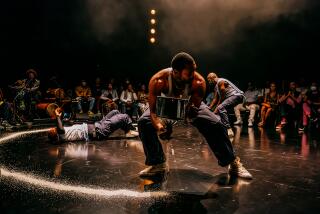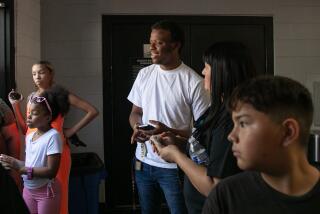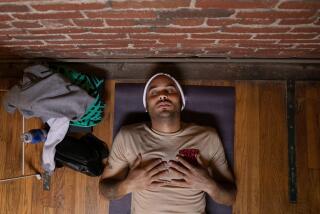Big Brothers Big Sisters effort seeks funds as well as volunteers
At a Starbucks in South Los Angeles, 14-year-old Bill Kirkpatrick III sat down with his mentor, Joe Egender, to set goals for the coming year.
On the teen’s to-do list for 2011: maintain a 3.0 or higher grade-point average, become a better role model for his 8-year-old brother, make it as a starter for the school basketball team and be “the flower that grew from concrete” — a reference to a poem by the late rapper Tupac Shakur.
FOR THE RECORD:
Big Brothers: An article in the Feb. 21 LATExtra about the Big Brothers Big Sisters organization said Joe Egender took his “little brother” Bill Kirkpatrick III to see Dr. Dre in concert. The artist they went to see was Drake. —
Since they were matched by Big Brothers Big Sisters of Greater Los Angeles nearly six years ago, the pair have spent many weekends together, riding roller coasters, racing each other in go-karts, browsing in bookstores or sharing a booth at their favorite Inglewood diner, the Serving Spoon.
The demand for such matchups is growing. For the first time in its more than 100-year history, Big Brothers Big Sisters of America is actively seeking donations through a nationwide campaign launched last month to help whittle down an expanding waiting list.
About 38,300 children nationwide — including more than 200 in the Los Angeles area — are waiting to be paired with adults, a 35% increase from February last year. Many more children are waiting to have their applications processed. In other cases, families decide not to apply when they find out that it can take a year or longer for a match to be made.
“Our youth in America are facing challenges that are wider, deeper and more complicated than perhaps ever before in our history,” said Karen J. Mathis, the national group’s president and chief executive. “There are more young people … who are in single-parented families, who are from low-income or below-poverty-level [homes], who have one or more incarcerated parent, who are the children of deployed military personnel, who may be in foster care and are in failing schools.”
Developed with the help of the Advertising Council, the Start Something campaign will use public service announcements and social media to explain the benefits of mentoring and to appeal for financial support as well as volunteers. Previous campaigns sought only volunteers.
The organization and its some 370 local agencies are doing better than many charitable groups in a tough economy. Last year, they raised close to $271 million — about 5% more than the previous year — and mentored about 225,000 young people between the ages of 6 and 18, Mathis said.
Most of the organization’s funding comes from the government, corporations and foundations with which it has long-standing relationships, Mathis said. But the financial support has not kept pace with demand for its services.
Local agencies do their own fundraising, and some have taken hits. The three active in Los Angeles — Big Brothers Big Sisters of Greater Los Angeles, Catholic Big Brothers Big Sisters of Los Angeles and Jewish Big Brothers Big Sisters of Los Angeles — saw their contributions drop about 10% in 2010 to $4 million, said Tisha Frank, who oversees agency development in the western United States. Together, they serve about 2,500 children.
Many local agencies have volunteers as well as children waiting to be paired, Frank said. What they lack, she said, are the resources to professionally support the matches. Each match costs the organization $1,000 a year on average nationwide.
Part of that goes toward recruiting the right volunteers, Frank said.
The group asks its “bigs” to meet with their “littles” at least twice a month for a minimum of a year, and many people balk at the commitment. Typically, more women volunteer than men, and the group will pair adults only with children of the same gender. There is also a shortage of volunteers who live in or are willing to commute to neighborhoods like South Los Angeles, which have more children looking for mentors.
Before a match is made, the volunteers are carefully screened, and extensive interviews are done with all parties — the big, the little and the little’s guardians. A match support coordinator will check in monthly with them to gauge how the relationship is progressing and provide help if needed.
The process often brings together people who, like Egender and Bill, would have not otherwise crossed paths. Egender, an actor from Kansas City, moved to Los Angeles in 2004 to build a film and television career. Bill, who was born with drugs in his system, is being raised by his grandmother in South Los Angeles.
Egender, 34, said he receives regular e-mails with suggestions of things to do with Bill. They have also been invited to picnics and other group outings.
Mathis said that kind of support has been critical to the group’s success. Research conducted by the Philadelphia-based Public/Private Ventures in 1994 and 1995 found that children mentored by Big Brothers Big Sisters for 18 months were 46% less likely to begin using drugs than their peers, 27% less likely to begin using alcohol, 52% less likely to skip school and 33% less likely to hit someone.
Still, Mathis said, Big Brothers Big Sisters is known as a place to donate time rather than money. The new campaign aims to change that.
“This is literally the first time that we have put a ‘donate’ button on the front of our website,” Mathis said.
When Egender was introduced to Bill, the boy was a sullen 8-year-old who struggled to read and kept getting into trouble for fighting. His father, who is schizophrenic, was in and out of prison, and his grandmother felt he needed a better role model. Bill hated the idea.
“I didn’t understand why he was here,” Bill said, as the two waited for a table at the packed diner one recent Saturday afternoon. “Every time we would take a picture, I would make a mean face.”
He is now happy to share details from their fishing trip to Lake Tahoe and a surprise trip to San Jose to see his favorite rapper, Dr. Dre, in concert. With Egender’s encouragement, Bill has worked his way from a special-needs school to a charter school and dreams of going to a university.
Bill’s grandmother, Debra Loyd, tears up when she recalls how Egender would bring the boy to visit her in the hospital when she was being treated for cancer. “He’s just part of the family,” she said.
Egender says he can always count on Bill to make him smile. “I got pretty lucky with this guy,” he said.
Bill compares the relationship to the characters in the Dr. Seuss book “Green Eggs and Ham.”
“He opens my mind up to new ideas,” Bill said. “He’s the best brother I could have.”
More to Read
Sign up for Essential California
The most important California stories and recommendations in your inbox every morning.
You may occasionally receive promotional content from the Los Angeles Times.










